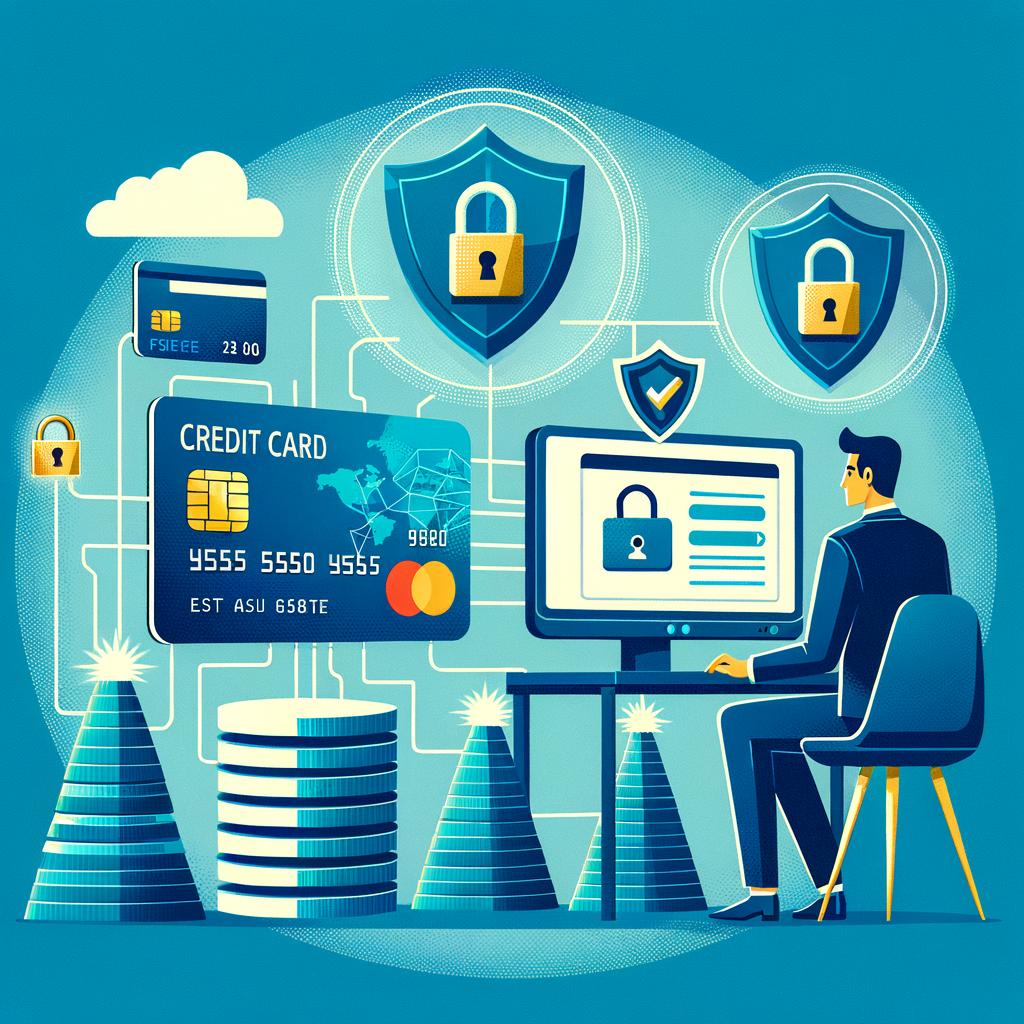Understanding and Preventing Credit Card Fraud in Online Transactions
Hey there! Have you ever wondered how those sneaky scammers manage to wreak havoc on people’s lives with credit card fraud? Well, it’s time to unravel the mystery and empower ourselves against these cyber-criminals! In this online world we live in, it’s crucial to understand the ins and outs of credit card fraud in online transactions, and more importantly, how to prevent it. So buckle up, get ready to dive deep into the thrilling world of thwarting scammers, and let’s put an end to credit card fraud once and for all!
Understanding the Tactics Employed by Credit Card Fraudsters in Online Transactions
When it comes to online transactions, credit card fraud has become an ever-present concern. Fraudsters employ various tactics to carry out their malicious activities, often leaving consumers vulnerable to financial loss and frustration. By understanding these tactics, we can better protect ourselves and prevent credit card fraud from happening in the first place.
1. Phishing: One of the most common tactics used by fraudsters is phishing, where they trick unsuspecting victims into revealing their credit card information through fake emails, text messages, or websites. These deceptive techniques can be incredibly convincing, often mimicking legitimate institutions or businesses. It’s crucial to remain vigilant and never provide personal information or credit card details unless you are certain of the authenticity of the source.
2. Malware and Skimming: Technology has opened doors for fraudsters to implant malicious software, commonly known as malware, onto computers or smartphones. This allows them to steal credit card information directly from the device without the user’s knowledge. Additionally, skimming devices, often placed on ATMs or payment terminals, can covertly capture card details as unsuspecting individuals conduct their transactions. Regularly updating your device’s security features and being cautious of suspicious devices will help mitigate the risk of falling victim to such schemes.
Unveiling Key Vulnerabilities: How Online Merchants Can Protect Themselves from Credit Card Fraud
With the rise of online shopping, credit card fraud has become a significant concern for both customers and merchants. Cybercriminals have become increasingly sophisticated in their methods, finding new ways to exploit vulnerabilities in online transactions. This post aims to shed light on the key vulnerabilities that online merchants should be aware of, as well as provide actionable steps that they can take to protect themselves and their customers from credit card fraud.
1. Weak Authentication Measures:
- Merchants must ensure that their website has strong authentication measures in place to prevent unauthorized access to customer accounts.
- Implementing two-factor authentication, such as requiring a unique code sent to the customer’s mobile device, can add an extra layer of security.
- Regularly monitoring and updating login credentials is vital to protect against brute force attacks.
2. Inadequate Payment Security:
- Merchants should prioritize the use of secure payment gateways that employ encryption technologies to protect customer payment information.
- Regularly performing security audits and assessments can help identify vulnerabilities in payment processing systems.
- Ensuring compliance with industry standards, such as PCI-DSS, can significantly reduce the risk of credit card fraud.
| Threat | Impact |
|---|---|
| Phishing Attacks | Customers may unknowingly provide credit card information to malicious actors, resulting in fraudulent transactions. |
| Man-in-the-Middle Attacks | Cybercriminals intercept and alter the communication between the customer and merchant, stealing sensitive payment information. |
| Card Skimming | Criminals attach devices to payment terminals, stealing credit card data during transactions. |
By understanding these vulnerabilities and implementing appropriate security measures, online merchants can protect themselves and their customers from the threat of credit card fraud. It is crucial to stay vigilant and regularly update security protocols to stay one step ahead of the ever-evolving tactics employed by cybercriminals.
Expert Insights and Proven Strategies to Safeguard Your Customers’ Credit Card Information
As online transactions continue to grow in popularity, it is crucial for businesses to prioritize the safeguarding of their customers’ credit card information. Credit card fraud poses a significant threat, not only to the financial well-being of individuals, but also to the reputation and trustworthiness of businesses. In this post, we will delve into the world of credit card fraud, exploring expert insights and proven strategies that can help you understand and prevent this menace.
One of the fundamental steps in safeguarding credit card information is to ensure the implementation of strong security measures. Encryption plays a vital role in protecting sensitive data, as it scrambles the information making it unreadable to unauthorized parties. Employing tokenization is another effective strategy; it replaces the customer’s credit card information with a unique digital identifier, reducing the risk of exposure. Additionally, integrating two-factor authentication adds an extra layer of security by requiring customers to provide a second form of identification before completing a transaction.
- Regularly monitor your website for any suspicious activities, such as multiple failed login attempts or unusual traffic patterns. Consider using website security tools or plugins designed to detect potential breaches.
- Stay up-to-date with the latest security protocols and maintain a secure server environment. This entails regularly patching and updating software systems, as well as educating employees about phishing and social engineering techniques employed by fraudsters.
- Implement fraud detection systems that can automatically flag suspicious transactions based on predefined rules or machine learning algorithms. Promptly investigate and take action on any flagged transactions to mitigate potential fraud risks.
| Technique | Description |
|---|---|
| Phishing | Fraudsters send deceptive emails or messages to trick individuals into revealing their credit card information. |
| Skimming | The illegal capturing of credit card data by thieves using devices installed on ATMs or payment terminals. |
| Carding | Fraudsters use stolen credit card details to make unauthorized purchases online. |
By implementing these expert insights and proven strategies, you can better protect your customers’ credit card information, gain their trust, and ensure the integrity of your online transactions. Remember, safeguarding against credit card fraud is an ongoing endeavor that requires vigilance and adaptation to the evolving tactics employed by fraudsters in the digital realm.
Taking Action: Practical Steps to Prevent Credit Card Fraud in Your Online Business
In the fast-paced world of online business, it’s crucial to understand and take action against credit card fraud. Fortunately, there are practical steps you can take to safeguard your online transactions and protect your valuable customers. Here are some key measures you can implement to prevent credit card fraud in your online business:
1. Implement secure payment gateways: Ensure your website integrates with reliable payment gateways that offer robust security features. Look for gateways that utilize encryption technology to safeguard payment information and enable two-factor authentication for added protection.
2. Stay updated on industry trends: As technology evolves, so do the techniques employed by fraudsters. Stay informed about the latest trends in credit card fraud and educate your team on how to spot suspicious activity. Additionally, regularly review and update your fraud prevention strategies to stay one step ahead of potential threats.
| Risk Level | Recommended Action |
|---|---|
| Low | Use Address Verification System (AVS) and Card Verification Value (CVV) checks
|
| Medium | Implement additional fraud detection measures like IP geolocation and device fingerprinting
|
| High | Consider implementing 3D Secure authentication for high-risk transactions
|
Remember, protecting your customers’ sensitive information is not just a legal obligation but also a trust-building exercise. By following these practical steps, you can create a secure online environment for your business and ensure peace of mind for both yourself and your customers. Stay vigilant and proactive in preventing credit card fraud, because the safety of your customers should always be a top priority.
Concluding Remarks
And that, my savvy readers, is the lowdown on understanding and preventing credit card fraud in online transactions! We’ve explored the dark alleys of this digital underworld, armed ourselves with knowledge, and come out the other side as fearless defenders of our hard-earned cash. So, go forth and conquer the online shopping realm with confidence!
Remember, folks, knowledge is power. By understanding the sneaky tactics employed by fraudsters, we can stay one step ahead. Keep those peepers peeled for suspicious emails, double-check those sketchy websites, and guard your precious credit card details like a fierce dragon guarding its treasure.
But hey, let’s not give in to paranoia just yet! We’re living in a marvelous age where we can conquer the world from the comfort of our couches. So embrace the digital revolution, take advantage of those online deals, and bask in the convenience it brings. Just don’t forget to protect yourself along the way!
Online shopping should be a safe and enjoyable experience, filled with endless possibilities and amazing discoveries. Armed with this knowledge, I have no doubt you’ll navigate these virtual waters like a pro. Shop smart, shop safe, and let the thrill of the digital realm fill your shopping carts without fear!
So, fellow internet explorers, go forth and conquer the vast world of online commerce armed with the sword of knowledge, the shield of caution, and the armor of vigilance. May the force (and fraud) be with you. Stay safe, my friends!






